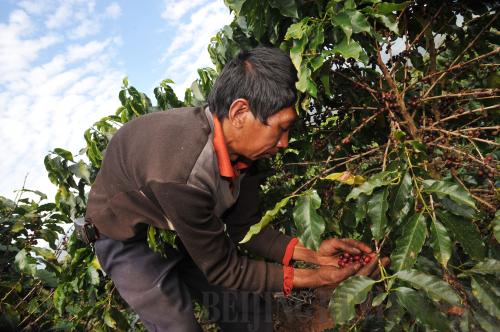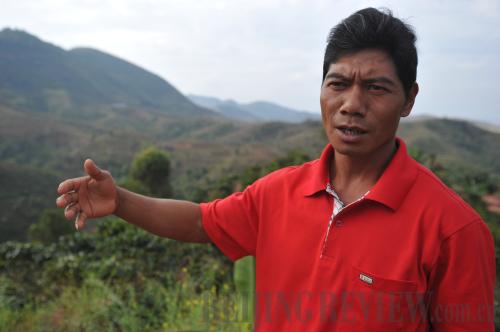|
 |
|
RAW AND READY: Fu Xiufang hunches over as he cups dozens of pure beans from a coffee plant (WEI YAO) |
For seven hours a day, Fu Xiufang picks raw coffee beans from the bushes on the Manzhongtian plantation high in the mountains of southwest China's Yunnan Province, close to the border with Laos.
"The ones with a reddish outer shell are the good ones. The blackened ones have been out too long. They'll be used for instant coffee," said Fu, cupping a batch of coffee beans to be deposited into a bucket nearby his feet.
Fu's hands are thick and coarse, his skin darkened from decades of work as a potato farmer under the sun. His few remaining teeth are yellowed and rotting. He's 38 years old but looks well beyond his age.
Still, life couldn't be better.
China's coffee industry is booming, and the potential to expand in a market still in its infancy is breathtaking. The Aini Group—China's largest coffee company—hires local Yunnan farmers and workers, like Fu, to help the industry grow.
"When I was working on a potato farm, I earned a few hundred yuan a month. Now I earn 1,000 yuan ($161)," said Fu. "I live with my parents here. They work on the plantation too and earn 700 to 800 yuan ($113-129) each."
The blistering growth of the industry has left Aini unable to keep up with demand and the company is short of hands to harvest its coffee crops and maintain its Manzhongtian plantation, located roughly 60 km east of the city of Pu'er, famous across China and the world for its tea. The worker shortage means plenty of coffee cherries aren't picked in due time and are left to burn in the sun.
 |
|
Bai Yingpei (WEI YAO) |
"We recruit farmers and workers from as far away as 1,000 km within Yunnan to come to the fields here," said Bai Yingpei, who manages the plantation.
Sixty farmers and their families call the plantation home, and many arrived through word of mouth from relatives and friends recruited by Aini.
Fu is from Zhaotong, a city over 900 km away in northeast Yunnan, close to the border with Sichuan Province. Zhaotong is a poor jurisdiction in already one of China's most impoverished provinces and is an easy target for recruits.
"I believe the living standards in the dormitory are better than the dwellings in their hometowns, which are shabby," said Bai. "Second, the climate is much better—it's like spring all year round. In their hometowns, it's very cold. Sometimes the snow is so bad they can't even work and earn money."
| 